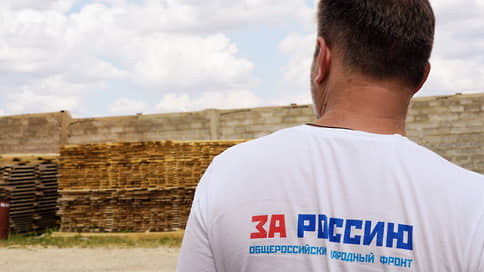Volunteer green police assistants – Newspaper Kommersant No. 164 (7365) of 09/07/2022
[ad_1]

The All-Russian Popular Front (ONF) is relaunching the institute of public environmental controllers, created five years ago. Green volunteers are expected to report violations of environmental laws to law enforcement. The presentation of the project took place in Kamchatka during the All-Russian Ecosystem Forum (ended on September 5). At the first stage, the ONF hopes to train 10,000 public inspectors in eight regions.
Public environmental inspections of the ONF should appear before the end of this year in the following regions: Sverdlovsk, Samara, Tula, Irkutsk regions, Krasnodar, Krasnoyarsk and Kamchatka territories. Yana Bukreeva, adviser to the head of the executive committee of the ONF, head of the Environmental Inspection project, explained to Kommersant that the regions were chosen not so much by environmental indicators, but “by the formed and most successful assets” of the ONF. It is assumed that “adult and willing” activists will be able to become inspectors: “They will be able to record violations in the field of environmental legislation and transmit information to the Ministry of Internal Affairs and the prosecutor’s office.”
The Institute of Environmental Inspectors of the ONF began to be implemented back in 2017. In February 2019, in a message to the Federal Assembly, President Vladimir Putin instructed the ONF to “ensure effective civil control over the solution of environmental problems,” relying on public environmental inspectors. In 2021, the Center for Advanced Management Decisions published an analytical report on the work of public inspectors in 2017-2020. Then the authors stated that “the institute did not work out”, despite isolated successful cases. On average, six activists per year per region received environmental inspector certificates. The researchers noted the “inconsistent legal status” of public inspectors, the “lack of authority and resources”, as well as the lack of “competence, motivation and local support”.
Deputy Chairman of the State Duma Committee on Ecology Alexander Kogan told Kommersant that now there are about 400 inspectors in the country – although two years ago their number exceeded 3 thousand. Other statistics, according to the deputy, remained unchanged – the ONF receives about 10 thousand environmental complaints per year, and inspectors collect about 5 thousand. These are complaints about water pollution, air pollution, excess of standards, illegal construction, deforestation, etc. Only 18-20% of all complaints reach the court and end with the appointment of administrative fines, Mr. Kogan.
According to him, now the ONF has revised the approach to assigning the status of an inspector, the list of his powers and the issue of financing his activities. Today, the status can be obtained by completing a simplified online training, which caused several major scandals in three years. In particular, in Tyumen, opposition activist Anton Mikhalchuk stated that he had received a certificate of a public environmental inspector signed by Olga Timofeeva, co-chair of the Central Headquarters of the ONF, and Dmitry Kobylkin, Minister of Natural Resources and Ecology of the Russian Federation, although he did not undergo training at all. Now, according to Yana Bukreeva, the status will be assigned in the inspectorates of the pilot regions, certifying candidates after a special training course. Those who passed the certification will be able to initiate inspections by the Ministry of Internal Affairs and the prosecutor’s office. This is possible even now, however, the ONF hopes for more active interaction with inspectors from departments due to the legally fixed status and authority to collect evidence of administrative violations. The work of inspectors will not be paid. “The inspector is a volunteer, he has no salary,” Ms. Bukreeva told Kommersant. “But in this project, the public inspector receives logistical support, such as the opportunity to get to the site, compensation for gasoline, equipment.” The ONF plans to pay for the expenses of the inspector’s visits, as well as supply him with equipment for taking water or soil samples from three sources – the organization’s budget, grants or “non-budgetary sources from partners,” Alexander Kogan explained. “The corresponding bill has already been submitted to the State Duma, and we hope to adopt it in the autumn session,” he added. “We will work out for six months or a year and try to spread the system throughout Russia. If we work systematically and competently, then within a year we may have from 2.5 to 10 thousand inspectors.”
[ad_2]
Source link








